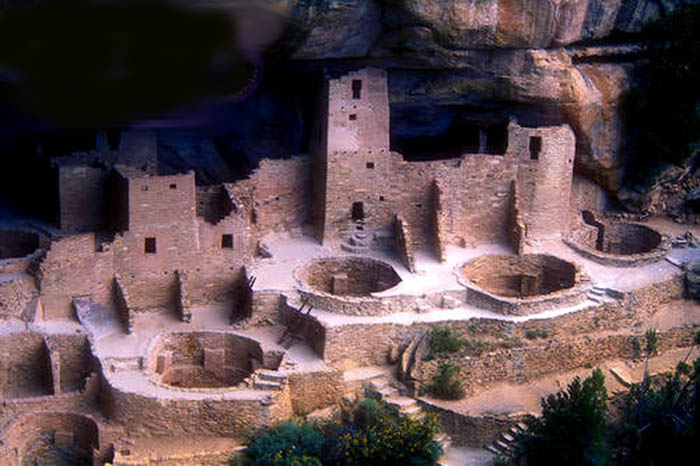Reading Leslie Marmon Silko's essay "Language and Literature from a Pueblo Indian Perspective" in her collection of essays titled
Yellow Woman and a Beauty of the Spirit, I was struck by a very interesting fact about indigenous storytelling:
"When the Badger clan people think of themselves, or when the Antelope people think of themselves, it is as people who are part of this story, and this is our place, and we fit into the very beginning..." (51)
While consuming different forms of media--movies, TV Shows, newspapers, and fiction, to name a few--I rarely feel as if the story being told is about me. If I do, it's through a somewhat flaky projection of archetypal struggles. I can identify with alienation as a human being, I can identify with loss, and I can identify with pleasure, but I can't quite live in the same world that I see in front of me (presented on a screen, in a newspaper or in a book). I'm not familiar with the faces of its "rocks", or with the buildings in the background. This is a scary by-product of what I see to be a societal emphasis on homogenized monoculture.
Honestly, I feel bad that we cannot concretely place ourselves within the stories our society produces for entertainment. I cannot ask the television to hone in on my relation to the story being told; it's a one-way street.
As far as this lack of intimate connection with story goes, it is worthy to mention Silko's analogy of the spider web and her assertions that "Viewers are as much a part of the landscape as the boulders they stand on" (27) and that "Connection with the spirit dimensions requires a figure or form that is all-inclusive" (29)
 |
| Which boulder are you? |
Where is this all-inclusive form?
It's funny to think of how many borders have been influenced by geographical "constants". Without the borders drawn, certain landmarks are still apparent, and some of those (like the Mississippi river and Appalachian mountains) serve to define state boundaries. Does this acknowledgment of nature's constancy by colonial minds serve to strengthen the Western sense of control/mastery over the physical world? Maybe this lack of a larger scope or understanding that
all structures will change over large quantities of time is the exact reason Westerners still keen on colonial "manifest destiny" keep taking as much from the Earth as they can, building our homes and cities like they will last forever.
We build "permanent" structures in our society, but also build weapons to destroy everything (and then some). What's the difference between the destruction of Dresden and the uninhabited pueblo ruins (refer to the following pictures and you're own knowledge)? I don't know if I can rest upon one definitive differentiation. Many factors are at work in each instance, I'm sure.
 |
| Aftermath of the bombing of Dresden |
 |
| Anasazi pueblo ruins |
|
In defense of
Dresden's immolation, the allied forces claimed that they were attacking the German military infrastructure. In our Western frame of "rational" thought, this suffices as a sound argument for the decimation of a predominately civilian populace. According to Silko's interpretation of the Pueblo people however,
"Survival depended upon harmony and cooperation not only among human beings, but also among all things--the animate and the less animate, since rocks and mountains were known on occasion to move." (29)
Survival of what? People, the human race, the Pueblo culture? I'd argue that the Pueblo are referring to humans in their most inclusive form, regardless of race or nationality, gender or language. I agree with this message of compassion, considering one of the large factors in the growth of Nazi fascism was the outrageous (and almost insurmountable) debt placed on Germany at the end of World War I. Everyone's a winner (though no one wins the jackpot) when cooperation is the fundamental virtue. Silko illustrates these two colliding worldviews:
"Younger people, people my parents' age, seemed to look at the world in a more modern way. The modern way included racism. My physical appearance seemed not to matter to the old-time people. They looked at the world very differently; a person's appearance and possessions did not matter nearly as much as a person's behavior. For them, a person's value lies in how that person interacts with other people, how that person behaves toward the animals and the Earth." (61)
The pains of having an alien culture (fundamentally convinced of their "rightness") infringe upon this time-honored elucidation of connectedness to one's physical and spiritual landscape must be frustrating. To stay true to the ancient traditions means to exist independently of "black" and "white" thought--independently of "yes" and "no", of "here" and "there".
And, just like in the extended analogy of the web, when one strand bends to the wind, the ripples are felt throughout the fragile silken fabric. When one portion of colonial ideology (such as an organized "tribal" government or contractual agreements) weasels its way into the lives of those who previously existed in its absence, there will be ripples. Sometimes they turn into tears, and usually when that happens, the spider just eats the web and... well, see for yourself:



